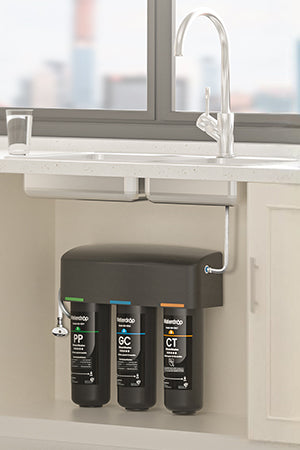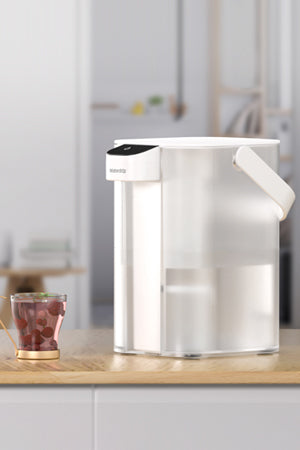Safe, pure drinking water is one of the healthiest parts of leading a healthy lifestyle. In Singapore, the tap is the go-to for most households because the water is properly regulated and relatively pure. However, concerns over chlorine, heavy metals, microplastics, and even taste still cause the majority of individuals to seek alternative filtration systems.
So, what is the healthiest method of filtering tap water? Let’s explore the options available, their pros and cons, and why more and more Singapore households are choosing superior filtration systems like Waterdrop for the cleanest available water.
Why Singaporeans Still Filter Tap Water?
Although Singapore tap water exceeds
international safety standards , filtering your water provides the following additional benefits:
-
Improved taste and odour: Potable water chlorine can affect taste.
-
Additional protection: Filtration offers another layer of defense against potential pollutants.
-
Safer for sensitive populations: Pregnant women, individuals who suffer from health ailments, and infants can prefer safer water.
-
Healthier cuisine and drinks: Coffee, tea, and soups are more palatable with purified water.
In most homes, installing a
water filter isn't an issue of safety alone—it’s quality of life as well.
What are the Types of Water Filters?
1. Activated Carbon Filters
These are usually stored in the faucet or the pitcher filter. They eliminate odors and chlorine and kill some organics.
- Advantages: Affordable, easy to use.
- Drawbacks: Weak filtration ability; it doesn't eliminate dissolved solutes, heavy metal ions, or bacteria.
2. Reverse Osmosis (RO)
Reverse osmosis water filters are one of the healthiest filtration methods for water. They force the water through a membrane that is semi-permeable and can remove up to 99% of contaminants, like lead, fluoride, microplastics, and even bacteria.
- Benefits: Provides the purest, safest water.
- Cons: Pricier, some need installation, and it wastes a small quantity of water via filtration.
3. Ultraviolet (UV)
These use UV light for killing viruses and bacteria.
- Pros: Excellent for disinfection.
- Cons: Does not remove chemicals, heavy metals, or particulates. Most effective when used along with another filter.
4. Distillation
Distillers heat up water and condense the steam, which deposits impurities.
- Pros: Removes most impurities.
- Cons: Energy-intensive and typically produces flat-tasting water.
What is the Healthiest Filtration Method?
When it comes to the healthiest way of filtering tap water, the best are the reverse osmosis (RO) systems because they provide the most comprehensive protection from the largest variety of contaminants.
For Singaporeans who seek safety and convenience,
Waterdrop Reverse Osmosis Hot & Cold Water Dispenser A2 provides peace of mind, especially for households with children, expectant women, and the elderly.
People Also Asked Questions
Q: Is bottled water healthier than filtered tap water?
A: Not quite. Bottled water can contain microplastics and can get stale over a period of time. Also, it creates plastic waste. Filtered tap water can be healthier, fresher, and greener.
Q: Do water filters eliminate fluoride in Singapore?
A: Most filters don't. Higher-end models like reverse osmosis, however, can actually remove fluoride and give you more control over what is going into your tap water.
Q: How can I determine if I should filter my tap water in Singapore?
A: Even though the tap water is safe in Singapore, filtering can make it more palatable, reduce the chlorine, and provide an extra barrier against potential contaminants within aged pipes.
Q: What is the simplest usable home filtration system?
A: Faucet filters and filtering pitchers are easy, but the healthiest option is a small reverse osmosis system. Under-sink or
countertop RO filters can be bought through companies like Waterdrop and are very easy and convenient to use and maintain.
Why Waterdrop Water Filters Are a Wise Choice for Singaporeans
In health-conscious water filtration, Waterdrop is a company recognized and trusted worldwide. That is why the majority of Singaporean families prefer them:
-
Multi-stage filtration: Removes chlorine, lead, heavy metals, fluoride, and microplastics.
-
Compact dimensions: Perfect for Singapore’s flats and apartments.
-
Eco-friendly: Latest water-saving technology reduces waste compared to the usual RO filters.
-
Improved tasting: Makes the taste of water, coffee, and dishes better.
-
Long -lasting filter life: Reduces the hassle of frequent replacements.
For families looking for the healthiest water every day, Waterdrop reverse osmosis systems provide an innovative yet pragmatic solution.
Practical Guidance for Choosing the Best Water Filter in Singapore
If you're just after better-tasting water, a carbon filter will do the trick. If you want the healthiest possible water, opt for reverse osmosis.
Singapore condos are not very large for kitchens—tiny ones like
Waterdrop ’s under-the-sink RO filters are practical.
A reliable system and top-quality replacement filters deliver consistent quality water and dollar savings over the long term.
Choose filters that have minimal wastewater and don't use plastic bottles.
Conclusion
What is the healthiest way to clean up tap water? As the healthiest and best-tasting option for the purest, safest water for Singaporeans, the number one pick is reverse osmosis filtration system. Though basic carbon filters will make the water tastier, only RO filters can offer total defense versus harmful elements and thus the healthiest alternative.
Small, environmentally friendly designs and technologically advanced multi-stage filtration make Waterdrop water filters a worthwhile purchase for all Singaporean households. They ensure that each glass of water you drink is not just pure but cool and healthy too.





































































